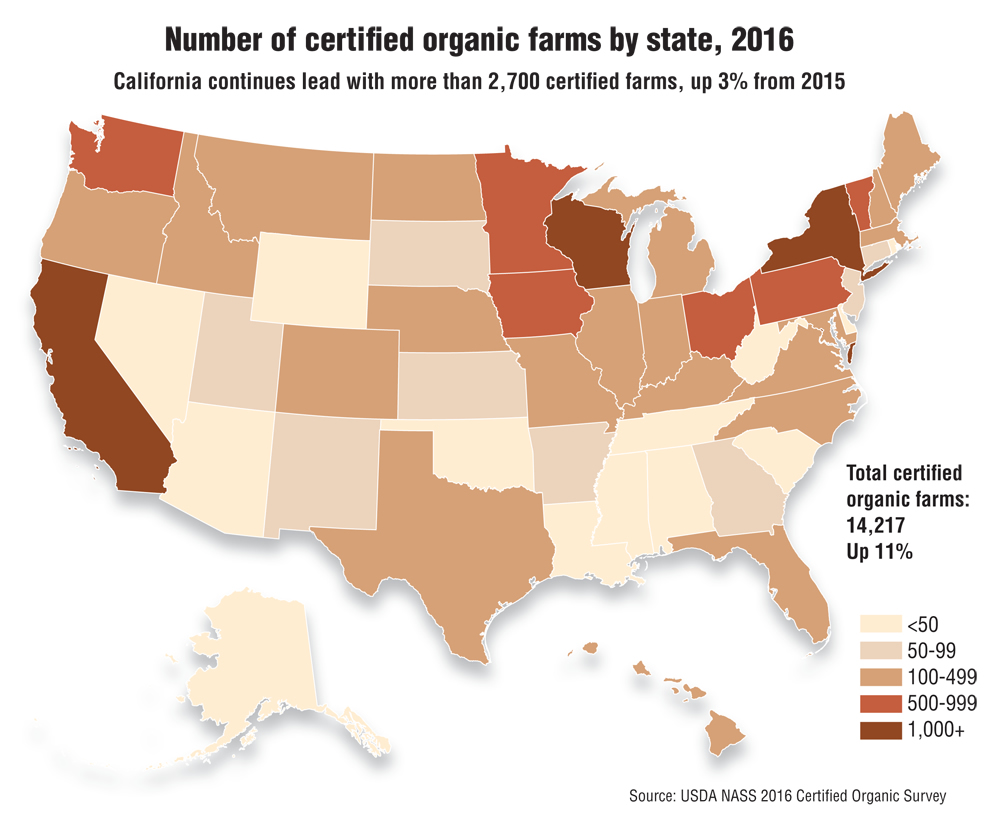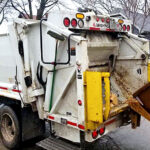The ability to produce a “Listable” product greatly depends on its input materials and how those are processed. Typical composts and digestates are relatively inexpensive to List.
Ron Alexander
The National Organic Program (NOP) is a regulatory program housed within the U.S. Department of Agriculture’s (USDA) Agricultural Marketing Service, and is responsible for developing national standards for organically produced agricultural products. The intent is to assure consumers that products with the USDA organic seal meet consistent, uniform standards. An important aspect of administering the Program includes accrediting entities that certify organic farming operations (e.g. California Certified Organic Farmers) and those that evaluate and ”List” allowable agricultural input materials.
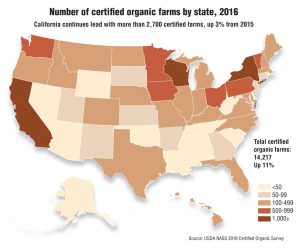
Number of certified organic farms by state, 2016
The most well-known product listing entity is OMRI (the Organic Materials Review Institute), although Washington State and California also operate product review programs. The ability to produce a ”Listable” product greatly depends on its feedstock (i.e., input materials such as yard trimmings, manure, etc.), as well as how it is processed. A listing entity will require a full description of the manufacturing process, e.g., composting, as well as details related to pathogen destruction. For compost, feedstocks such as yard trimmings, food waste and manure are allowable, but biosolids are not. With yard trimmings and food waste, it is important to have processes in place to remove any physical contaminants, including biodegradable plastic materials before actual composting (or anaerobic digestion).
More and more compost manufacturers, and producers of other recycled organics products, have been interested in getting their products listed so they are allowed for use in organic production. Reasons for this include:
• Allows for (easier) sale to certified organic farmers
• Some wholesale customers desire or require a Listing (e.g., ”Bay Friendly” trained landscapers in California)
• Mass merchants are requesting or requiring it on various lawn and garden products (e.g., compost, soil amendments and media, fertilizers)
• Use of OMRI Listing for product differentiation, to try to raise value, as well as to assist in product branding
The NOP is in place to ensure that the expectations of the buyer of the certified organic product (food, feed or fiber) are met. These expectations (and NOP requirements) include no biosolids, GMOs (genetically modified organisms) or irradiated materials in a Listed or allowable product, and minimal (if any) synthetic ingredients. Buyers expect that the finished products are made from more traceable feedstocks, leading to less contamination from man-made chemical ingredients, hopefully making them “safer” for use.
Growth In Organic Agriculture, Landscaping
Over the past 10 to 20 years, certified organic agriculture has been significantly expanding in the U.S. and the world. It has been common to see increases in organically cultivated acreage of 15 to 20 percent annually. In 2016, the market value of certified organic agricultural products in the U.S. was estimated at $7.6 billion, up 23 percent from 2015, according to USDA’s National Agricultural Statistics Service. It was also estimated that organic farmers in the U.S. cultivated 5 million acres of certified land in 2016, up 15 percent from 2015. California is the largest certified organic farming state by crop acreage and product sales. Along with this trend, sustainable farming practices and interest in improving soil health have also expanded the use of organic inputs.
Interestingly, although the growth in organic agriculture has increased, the demand from the landscaping and retail sectors may be more impressive. Various environmental and sustainable landscaping programs have been established throughout the U.S., and often these programs require use of Listed organic products. These landscaping programs typically promote soil health, reduced water usage, and surface water protection.
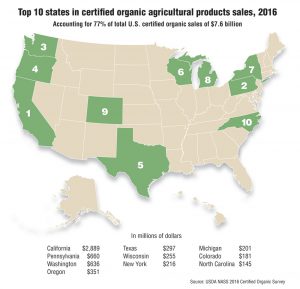
Top 10 states in certified organic agricultural products sales, 2016
Along with this, mass merchants have been suggesting and/or requiring their suppliers to provide more Listed soil and fertilizer products. This has increased demand for Listed composts, as both regional and national lawn and garden products companies have sought expanding volumes of Listed composts. While the sale of Listed products has expanded significantly over the past 5 years through mass merchants, independent garden centers have been carrying these products for 10 years or more.
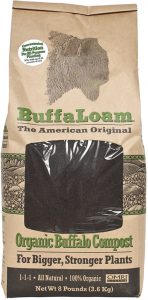
The process of listing a product, depending on the listing entity, usually takes 3 to 6 months.
Pursuing A Listing
Listing your compost and/or compost blends may open new marketing opportunities, help to assure usage and/or increase product value. The process of Listing a product, depending on the Listing entity, usually takes 3 to 6 months. The cost is highly dependent upon the size of the company and the number of ingredients in a product. That stated, typical composts, digestates and fertilizer products made from recycled organics (regardless of the number of sources) are relatively inexpensive to list.
It should be noted that individual products are Listed, not the facilities themselves. Therefore, if blended products are manufactured (e.g., potting media, bioretention soil), or multiple types of compost products, each one must be Listed. Also, Listing entities may require a site inspection, and will require being informed if any significant processing changes are made and/or new product ingredients (input materials) are used.
Ron Alexander is president of R. Alexander Associates, Inc. (Apex, North Carolina, 919-367-8350, www.alexassoc.net), a company specializing in product and market development for organic recycled products. He is author of ‘The Practical Guide to Compost Marketing and Sales’ (2nd Edition published by BioCycle) and has almost 35 years of experience in compost marketing. Mr. Alexander serves as an Industry Liaison to AAPFCO (Association of American Plant Food Control Officials) and assists companies in Listing their products.


